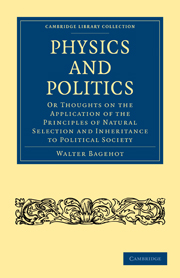 Physics and Politics
Physics and Politics Summary
One peculiarity of this age is the sudden acquisition of much physical knowledge. There is scarcely a department of science or art which is the same, or at all the same, as it was fifty years ago. A new world of inventions—of railways and of telegraphs—has grown up around us which we cannot help seeing; a new world of ideas is in the air and affects us, though we do not see it. A full estimate of these effects would require a great book, and I am sure I could not write it; but I think I may usefully, in a few papers, show how, upon one or two great points, the new ideas are modifying two old sciences—politics and political economy. Even upon these points my ideas must he incomplete, for the subject is novel; but, at any rate, I may suggest some conclusions, and so show what is requisite even if I do not supply it.
If we wanted to describe one of the most marked results, perhaps the most marked result, of late thought, we should say that by it everything is made ‘an antiquity.’ When, in former times, our ancestors thought of an antiquarian, they described him as occupied with coins, and medals, and Druids' stones; these were then the characteristic records of the decipherable past, and it was with these that decipherers busied themselves. But now there are other relics; indeed, all matter is become such.
- Type
- Chapter
- Information
- Physics and PoliticsOr Thoughts on the Application of the Principles of Natural Selection and Inheritance to Political Society, pp. 1 - 40Publisher: Cambridge University PressPrint publication year: 2010First published in: 1873


